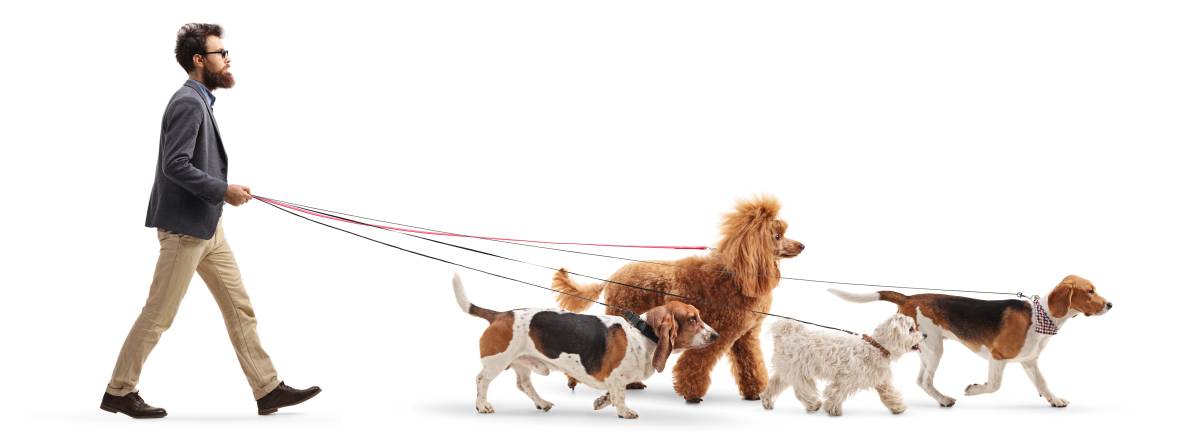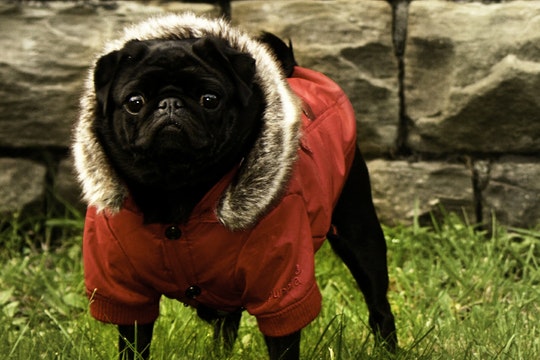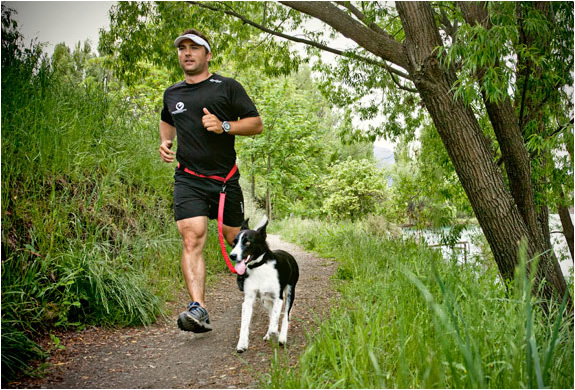Does your dog eat grass? Does he often seem to enjoy grass? You may have many questions when it comes to your pup and his grass-eating habits. We done some research and put together some information on why your fur baby may enjoy a grassy salad every once in a while.
Connect with a verified veterinarian in minutes. Licensed vets are available 24/7 to answer your questions. No need to worry about your furry family member.
Why Do Dogs Eat Grass?
Just what makes a dog eat grass anyway? Seeing a dog eating grass is pretty common, but why? Aren’t dogs carnivores? Researchers and scientists would say yes, dogs are definitely carnivores; however, some wild canines (including wolves) do eat grains on a regular basis. So, dogs are more properly termed “facultative carnivores,” which in simple terms means that they eat both meat and plant matter. Dogs are not strictly carnivores, herbivores, or omnivores—they’re somewhere in the middle between carnivore and omnivore. This means that dogs generally get most of the nutrients they need from meat, but they can also find some nutrients in plant matter on an occasional basis.
Dogs who enjoy an occasional “grass salad” are probably healthy and may only be looking for a snack between meals. However, there are other reasons your dog may be eating grass.
Dog Eating Grass and Vomiting
If you see your dog eating grass and vomiting, it’s a good idea to observe your dog, and call the vet to make an appointment if necessary. Why do dogs eat grass when sick? Dogs often eat things we find disgusting. They will eat things that can make them sick, such as meat that’s been around too long, etc. And sometimes an underlying health condition may be making them sick enough to vomit. If your dog is eating grass on a more or less regular basis and throwing up, it may be time to call the vet.
Here are signs and symptoms to watch for when your dog eats grass and vomits:
- Change in frequency of urination
- Loss of appetite
- Blood in vomit (or stool)
- Lethargy (that seems unusual)
- Change in thirst
- Abdominal pain
- Diarrhea
- Weight loss
- White or pale gums
- Collapse
These could be signs that your fur baby’s really sick if he’s vomiting often. However, if he vomits once and then seems to be OK, he may have just had an upset stomach or a tummy bug. If you notice him vomiting regularly or quite often, then it could be a sign of:
- Food allergies
- Metabolic disease
- Cancer
- Inflammatory bowel disease
- Infectious disease
If your canine companion begins to vomit all of a sudden, then he could be suffering from:
- Pancreatitis
- Kidney failure
- Liver failure
- Bloat
- Parvovirus
- Intestinal parasites
- Intestinal obstruction
- Addison’s disease
If you notice any of these symptoms in addition to vomiting, then be sure to make a quick trick to the vet. They’ll want to do a complete physical, which may include blood tests and other tests needed to make the right diagnosis. They can then determine the right treatment for what may be ailing your fur baby.

Review symptoms, medications & behavior to keep your pets healthy with a Vet Online in just minutes.
Ask a Vet Live NowDog Eating Grass Frantically
Have you noticed your dog desperate to eat grass? Then it could be he has an upset stomach. The research is still out, but most doggie parents have noticed grass eating was more common when their fur babies were nauseated. Nausea can be caused by many conditions—from overeating to diseases.
In dogs, nausea can also be caused by trouble with the stomach and/or intestines, as well as an underlying health issue such as cancer, kidney problems and even diabetes mellitus.
If your dog suffers from occasional nausea, you may see him head for the grass. He may eat some grass and then vomit. This is normal and OK, as long as his bowel movements are normal and he’s acting normal. If he’s frantically eating grass on a regular basis, then it’s time to head for the vet. The cause could be an underlying health issue, or he may not be getting enough nutrients in his diet.
Other Reasons Dogs Eat Grass
Dogs are basically something like a garbage can on legs—they’ll eat almost anything and everything. In fact, dogs love to scavenge. Canines, including wild canines, are opportunistic scavengers. You may find them gnawing on a juicy deer leg left in the road by another meat-eater in the neighborhood, or maybe your precious canine has found he likes to scarf down potato skins from the garbage! Opportunistic scavengers will eat anything that supplies needed nutrients.
Dogs may also turn to alternative food sources, such as grass, if they’re not getting enough to eat. Or dogs may choose to graze on grass for the added nutrients. Both reasons are common in wild and domesticated canines. Have you heard of pica? This is a psychological disorder where people or animals turn to non-foods in order to self-soothe or even in a search for nutrients. Eating grass can help a dog pass the time or even soothe anxiety. And then some dogs simply enjoy eating grass for their own reasons. Maybe they enjoy the texture or taste—we just don’t know for sure.
Is Eating Grass Dangerous for my Dog?
Is grass-eating harmful to dogs? The short answer is yes and no. How can both answers be correct? In most cases, dogs eating grass is no big deal. It’s just something dogs occasionally do without harm to themselves. Now, your yard may develop a few bald places if your pup loves to chow down on grass. This harmful to your yard, not your dog!
However, grass can be dangerous if it’s been treated with chemicals, such as herbicides and pesticides. These substances are known to cause health problems in both humans and animals. Dogs eating treated grass can become poisoned by the chemicals, either by eating the grass or licking their paws. Not only that, but these chemicals can be absorbed through the skin. In addition some dogs may try to eat weeds and plants, which can also be toxic to them. The grass in your yard or at the park can also be contaminated with fecal matter and intestinal parasites—both of which can make your dog sick if he eats them. While grass alone is probably OK, grass and other plants can be dangerous for the reasons mentioned above. If you’re unsure if the grass or plants are safe, then it’s best to keep your dog from munching them for any reason.
How to Stop My Dog from Eating Grass?
You may have decided that the grass your pup’s eating isn’t the best for him. In that case, you’ll need to find ways to get him to stop chomping the grass. Here are some solutions that might work.
1. High fiber dog food: if you suspect your dog is eating due to a nutritional deficiency, then first have him checked by the vet. If your pup is otherwise healthy, then your vet may have you try a high-fiber, higher quality dog food. This might be enough to get your dog to stop eating grass, especially if he suffers from pica. You might consider a dog food such as Blue Buffalo Wilderness High Protein Grain Free, Natural Adult Dry Dog Food. This food is specially formulated to be high in both protein and fiber, while providing your dog with his daily nutrients.
2. Positive reinforcement training: this is a recognized training method used to train many animals, including dogs. Dogs love to please their pet parents, so using positive methods to reinforce good behavior can bring about fast results with your fur baby. When you’re out for a walk or hanging out in the backyard with your canine companion, keep a few of his favorite treats on hand. When you notice him going for the grass, then call him to you and offer him a healthy treat instead. Do this each time your pup is determined to eat grass. It may take a while, but consistent training will eventually bring about the end of your dog’s grass eating. However, if your dog is determined to eat grass, be sure to make an appointment with the vet. You’ll need to make sure there is no underlying health problem causing your dog to crave grass.
3. Affection & attention: giving a bored dog attention and affection is another way to keep him from eating grass. Some dogs will do negative behaviors to get any attention at all, even if it’s only being scolded. Any attention is better than no attention. If your dog seems bored, then be sure to spend time playing and exercising with him. And don’t forget to cuddle with him, scratch his favorite itchy spot, etc. All of this shows a dog you love him. Give him the attention and love he needs, and your pup may just stop eating the grass on his own.
4. The need for greens: if your dog just seems to enjoy the flavor/texture of his greens, then you might think about buying a tray of grass at your local pet shop. Maybe your dog truly loves eating grass. This is OK, as long as he’s otherwise healthy and in good spirits. Eating outdoor grass can be dangerous due to chemicals such as herbicides, pesticides and even fertilizers. Instead, you might consider a product such as Organic Dog & Cat Wheatgrass Growing Kit for Pet. This product is a kit that allows you to grow wheatgrass indoors on a special tray! The grass is organic, and is filled with vitamins, minerals and more that are all healthy for your dog (or cat!). Your dog will enjoy fresh grass that’s safe to eat!
As you can see, dogs will eat grass for many reasons. If your dog is otherwise healthy and active, then it’s probably OK for him to enjoy his grassy salad. On the other hand, if your pup is showing any signs of illness, then it’s best to take him to the vet for a thorough exam. Most grass-eating is normal for dogs; however, it can be a sign of an underlying health problem. If the vet says your canine companion’s OK, then let him enjoy his grass. Just make sure it’s free of chemicals that could make him sick!
Connect with a verified veterinarian in minutes. Licensed vets are available 24/7 to answer your questions. No need to worry about your furry family member.

Kyoko
Kyoko is from a family of 3 and moved to New York with her parents and siblings when she was 13. Kyoko is fond of spending a great amount of time with pets, specifically her beagle Luna and cat Missy. Her boyfriend often complains that she spends too much time giving attention to their animals. Kyoko has written dozens of articles concerning pets and is aiming at owning a pet shop one day!
Review symptoms, medications & behavior to keep your pets healthy with a Vet Online in just minutes.
Ask a Vet Live Now



